
Rosaceae, the rose family, is a medium-sized family of flowering plants that includes 4,828 known species in 91 genera.

Filipendula ulmaria, commonly known as meadowsweet or mead wort, is a perennial herbaceous plant in the family Rosaceae that grows in damp meadows. It is native throughout most of Europe and Western Asia. It has been introduced and naturalised in North America.
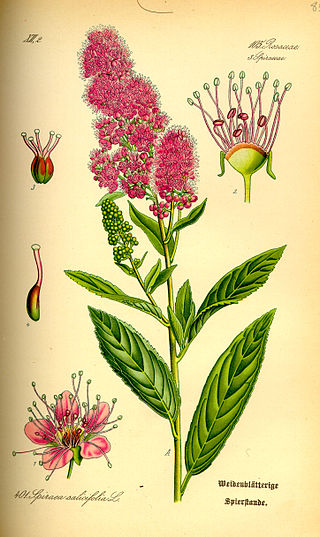
Spiraea, sometimes spelled spirea in common names, and commonly known as meadowsweets or steeplebushes, is a genus of about 80 to 100 species of shrubs in the family Rosaceae. They are native to the temperate Northern Hemisphere, with the greatest diversity in eastern Asia.

Aaron's beard may refer to the following plants having numerous stamens or threadlike runners:
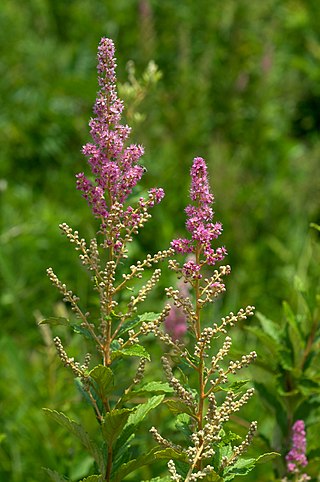
Spiraea tomentosa, commonly known as steeplebush, meadowsweet, or hardhack, or eastern hardhack, is a flowering plant native to the eastern United States and Canada.

Filipendula is a genus of 12 species of perennial herbaceous flowering plants in the family Rosaceae, native to the temperate regions of the Northern Hemisphere. Well-known species include meadowsweet and dropwort, both native to Europe, and queen-of-the-forest and queen-of-the-prairie, native to North America.

Searsia lucida, previously known as Rhus lucida, and commonly known as the varnished kuni-rhus (English) or blinktaaibos (Afrikaans).

Spiraea splendens is a shrub of the rose family (Rosaceae) native to the western mountains of North America, from California to British Columbia, commonly known as dense-flowered spiraea, rose meadowsweet, rosy spiraea, subalpine spiraea, and mountain spiraea. It is commonly found at elevations between 2,000 feet (610 m) and 11,000 feet (3,400 m) on inland mountain ranges. The plant is adapted to cold, moist, rocky slopes, subalpine forests and meadows.

Spiraea japonica, the Japanese meadowsweet or Japanese spiraea, is a plant in the family Rosaceae.
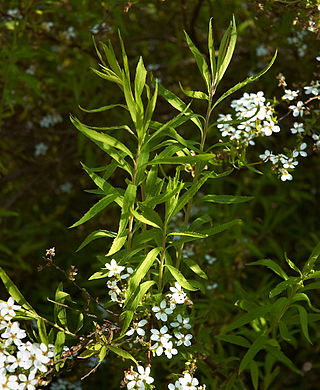
Spiraea thunbergii (珍珠绣线菊), Thunberg spiraea or Thunberg's meadowsweet, is a species of flowering plant in the rose family, native to East China and Japan, and widely cultivated elsewhere.

Spiraea latifolia, commonly known as broadleaf meadowsweet, is a shrub in the family Rosaceae. It has often been treated as a variety of Spiraea alba. It is the primary host plant for Hemileuca lucina.
Meadowsweet may refer to:
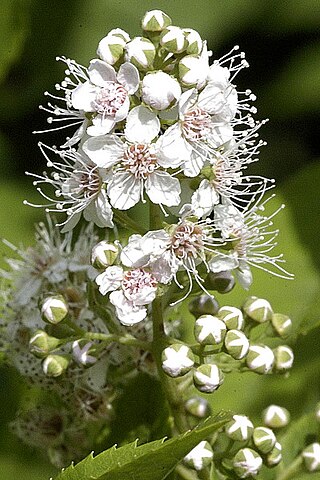
Spiraea alba, commonly known as meadowsweet, white meadowsweet, narrowleaf meadowsweet, pale bridewort, or pipestem, is native to the wet soils of the Allegheny Mountains and other portions of eastern North America, but is currently endangered in the state of Missouri. It is naturalized in other parts of the world.
S. alba is an abbreviation of a species name. In binomial nomenclature the name of a species is always the name of the genus to which the species belongs, followed by the species name. In S. alba the genus name has been abbreviated to S. and the species has been spelled out in full. In a document that uses this abbreviation it should always be clear from the context which genus name has been abbreviated.

Spiraea virginiana is a rare species of flowering plant in the rose family (Rosaceae) known by the common names Virginia meadowsweet and Virginia spiraea. It is native to the southern Appalachian Mountains, where it has a distribution scattered across nine states. However, most populations are very small and poor in quality. It is threatened by disturbances in the hydrology of its habitat, introduced species of plants, and other threats. It is a federally listed threatened species of the United States.

Spiraea chamaedryfolia, common name germander meadowsweet or elm-leaved spirea, is a species of plant belonging to the family Rosaceae.
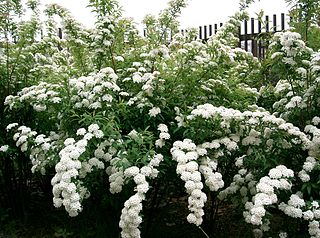
Spiraea cantoniensis, the Reeve's spiraea, bridalwreath spirea, double white may, Cape may or may bush, is a species of plant native to China, belonging to the rose family Rosaceae. An ornamental plant featured in gardens, it is a shrub growing up to 1.5 metres (4.9 ft) tall with frothy, pompom-like clusters of snow-white flowers borne along arching branches that bloom in May in its native country, hence its common name.

Spiraea trilobata, known as Asian meadowsweet, is a species of flowering plant in the family Rosaceae. It was first formally named in 1771. Spiraea trilobata is native to Asia. It has occasionally naturalized in the United States.

Spiraea salicifolia, the bridewort, willow-leaved meadowsweet, spice hardhack, or Aaron's beard, is a species of flowering plant in the family Rosaceae. A shrub, it is native to east-central Europe, Kazakhstan, all of Siberia, the Russian Far East, Mongolia, northern China, Korea, and Japan, and it has been widely introduced to the rest of Europe and to eastern North America. It has been cultivated since the 1500s for hedges and similar applications, but is not particularly well-behaved.


















